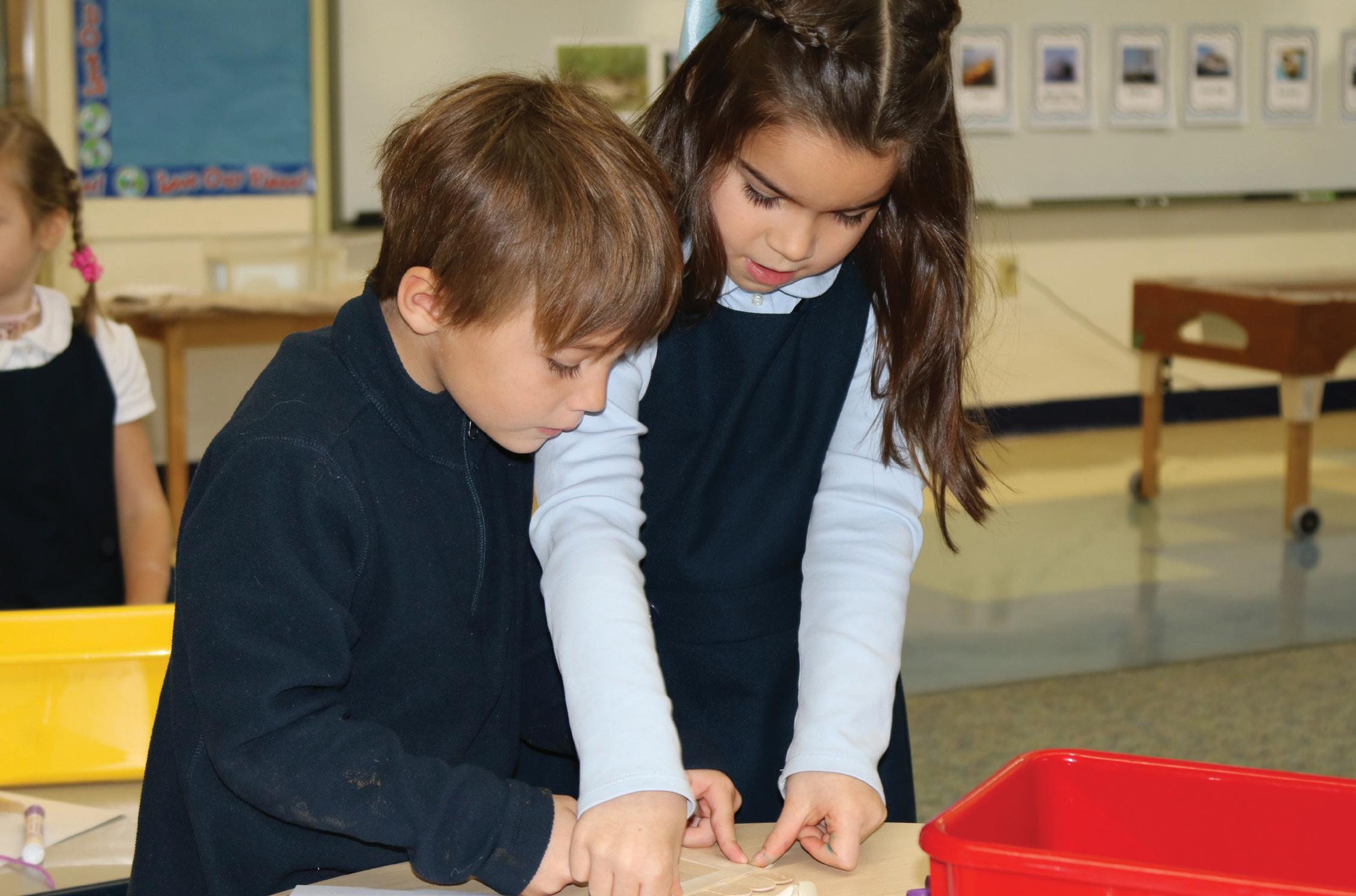
5 minute read
Kindergarten
Kindergarten at Far Hills
Far Hills Country Day School’s Kindergarten serves as the bridge between the emergent curriculum and readiness skills formed in our Preschool and the foundational skills necessary for continued success and independence. We provide a balance between honoring students’ individual interests and a developmentally appropriate introduction to the Lower School curriculum by conducting studies as a whole group, small group, and 1:1 lessons.
Far Hills honors the unique age of Kindergarten students and their gradual transition into a formal learning environment by focusing on social emotional skills, helping students understand what it means to be part of a learning community, and assisting them in developing the mindset of a learner. They problemsolve and experience what it means to be resilient and persevere through challenges.
Each trimester, our expert Kindergarten teachers build upon the students’ maturation and self-confidence as learners. They support the mastery of academic skills and conceptual understanding in Kindergartners—this promotes intrinsic motivation for children and keeps them excited about learning.
Language Arts: Reading and Writing
Far Hills Country Day School’s Kindergarten classes work with differentiated guided reading groups that allow students to learn to read grade-level appropriate texts and beyond, with a focus on comprehension. Students explore poetry, fiction, and nonfiction and produce personal responses to literature. Our Orton Gillinghamtrained Kindergarten teachers focus on phonological awareness. Students learn and practice sight words daily using games and movements while also learning the mechanics of reading, directionality, and identifying parts of a book.
Students also have the opportunity to work with members of our Reading Support Team, either 1:1 or in small groups throughout each week, to continue to challenge them on their reading level while encouraging them to gain fluency and self-confidence in their reading ability.
Students work on developing narratives and expository writing skills through the Write From the Beginning program. Students begin their writing journey in Kindergarten by telling a story with a picture and labels. They progress to short written phrases and eventually complete sentences. The Handwriting Without Tears program provides multi-sensory, kinesthetic, hands-on instruction for students to learn and practice writing letters.
Social Studies
Our Kindergarten students explore, discover, and discuss the similarities and differences in people and places. They start by taking a close look at home life and gradually zoom out to learn about world communities. Building from there, the students learn to identify rural, urban, and suburban communities. Students also explore and learn to identify the differences between needs and wants.
Math
In Kindergarten, students develop a strong number sense by learning to count to 100 by ones, twos, fives, and tens, identifying and writing numerals, and comparing and ordering whole numbers. Using objects, pictures, and number models, students create addition and subtraction sentences. Students continue to build their math skills by collecting and organizing data
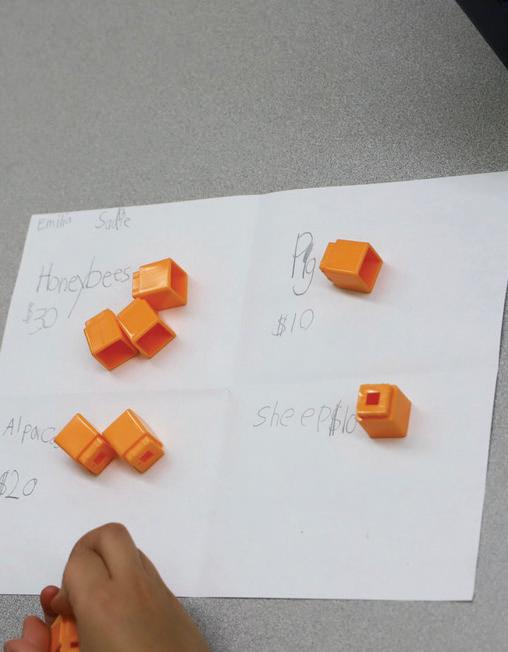
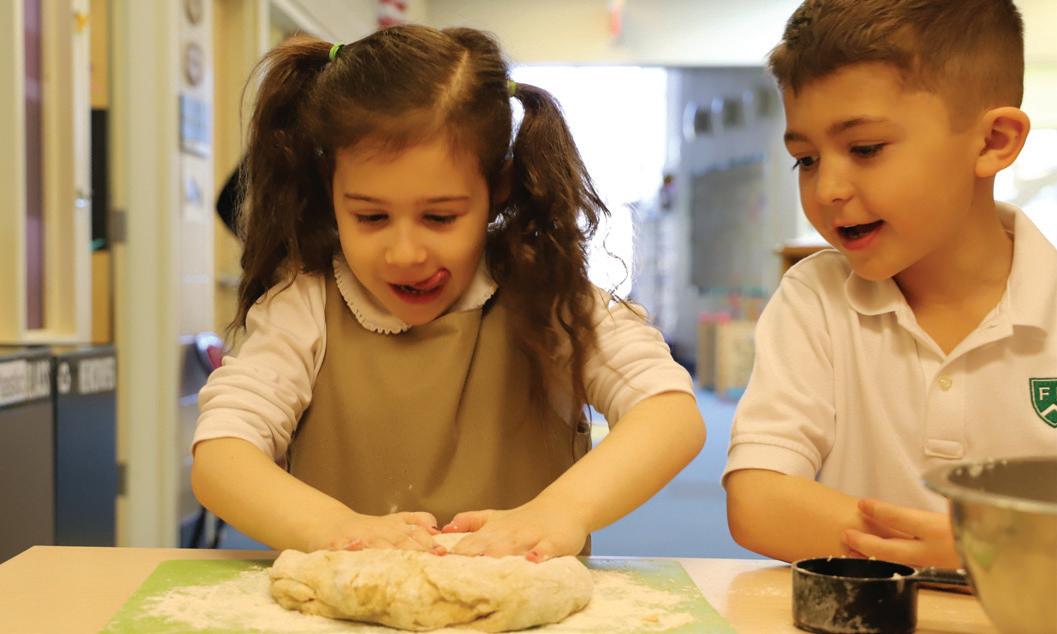
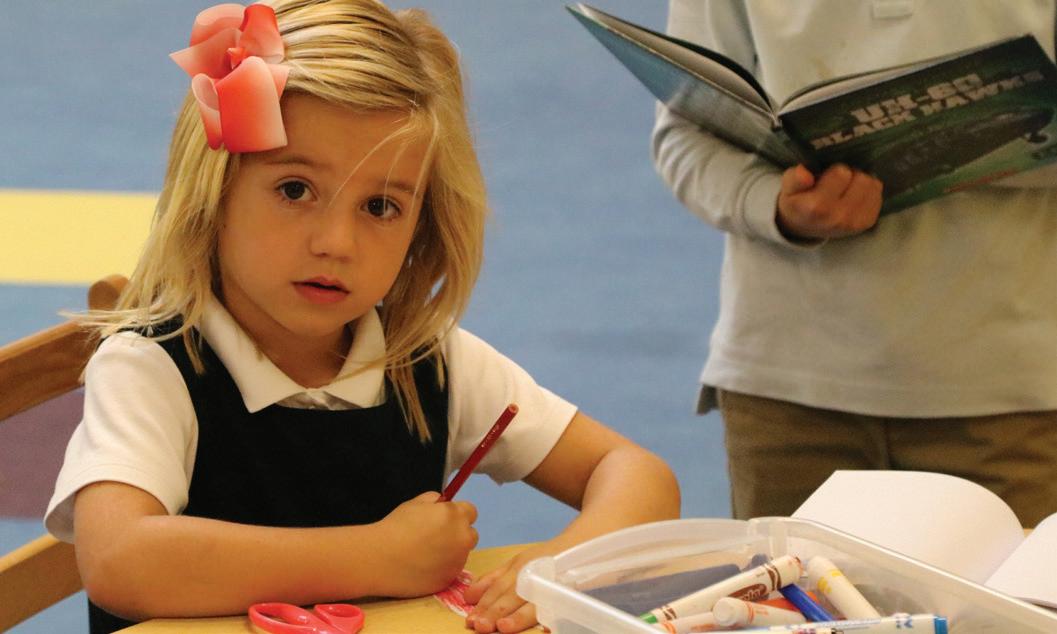
in tally charts and bar graphs and developing a vocabulary to help them express concepts of geometry and spatial sense, using appropriate language to describe attributes to compare objects according to length, weight, and size. Kindergarten students build on the foundation of pattern creation established in Preschool through a variety of daily calendar activities.
Science
Through hands-on exploration, inquiry, and skill development, Kindergarten students learn about science phenomena across Life, Earth, and Physical Science disciplines. Core skills include: observing, asking questions, defining problems, making models, and communicating both verbally and through journal writing. Kindergarteners get to explore topics that include plant and animal needs, sunlight and warmth, trees, sustainability, and forces. By the end of the school year, Kindergarten students are able to work safely in a lab setting. The signature sciencebased project for Kindergarten is a ‘Pond Dip’ with Raritan Headwaters, which examines the health of our on-campus pond by studying the variety of macroinvertebrates.
Spanish
In Kindergarten, routine is established as the children begin to introduce themselves in Spanish, expressing basic greetings and phrases. Colors, numbers, family members, animals, and parts of the day are all introduced and practiced throughout the year. In order to celebrate Spanish culture, students are exposed to new foods in a variety of culinary projects.
Music
In Kindergarten, music classes continue to focus on skills developed and explored during the Preschool years. They continue to learn how to sing, begin to explore music literacy and perform on various classroom percussion instruments. Students also experience music and movement classes where they learn to master fine and gross non- and locomotor skills through music. Our Kindergarten musicians perform in three productions throughout the year: K-8 Holiday Concert, Kindergarten Playwright Production, and the Lower School Closing Ceremonies.
Visual Art
Kindergarten students are introduced to pottery and handbuilding with clay, painting, and drawing, while creating landscapes and self-portraits. Through experimentation, Kindergarteners build skills in various media and approaches to art-making. Students learn to interpret art by identifying subject matter and describing relevant details. Students also work on a cross-curricular project as they create the theatrical scenery and props that will be used in the Kindergarten play.
Learning and Design
Kindergarten students start to leverage technology to practice skills, learn information, and communicate their knowledge. They primarily use iPads and are introduced to various apps and tools to help them accomplish various goals. The concept of Digital Citizenship is introduced with a focus on staying safe online and finding a balance with offline activities. Students start to learn about coding concepts through a combination of unplugged lessons and appropriate apps, including work with the Dot robot. All of this comes together when students enjoy the opportunity to use the green screen and Shadow Puppet app for their signature “Wonder” project.
Library
In Kindergarten, students continue to focus on fiction stories, authors, and illustrators and are introduced to nonfiction. Kindergarten students begin to learn about the research process as they use Thinking Maps to take notes and learn about paraphrasing, writing, using nonfiction resources, and citing sources. Their learning is typically expressed with a particular digital
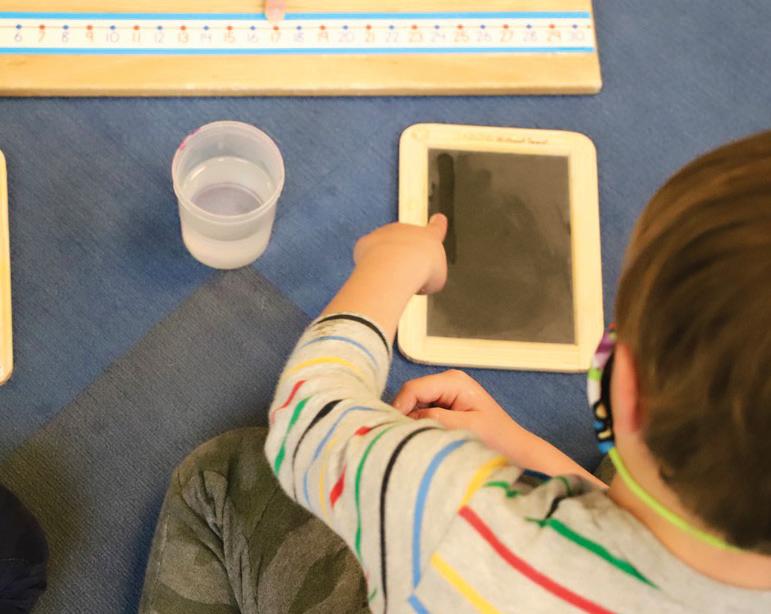
tool (PicCollage, Google Slides, Google Sites, Book Creator, etc.).
Social-Emotional Learning
Far Hills Country Day School’s Kindergarteners continue to build on the social and emotional skills they started in Preschool. In Kindergarten, we incorporate Far Hills Country Day School’s Five Pillars of Character into our daily curriculum. Kindergarten students have a main focus on Kindness throughout the year. The students learn to recognize and record acts of kindness they witness in and out of the classroom.
Highlights of Grade Level Objectives
By the end of Kindergarten, Far Hills Country Day School students will be able to: • print upper- and lower-case letters of the alphabet and the numerals zero to nine using standard form, proportions, and spacing; • count to 100 using ones, twos, fives, and tens; • read and comprehend kindergarten-level texts independently; • write a complete thought in complete sentences with proper punctuation and grammar; and • make predictions, formulate questions, record observations, and communicate results.










